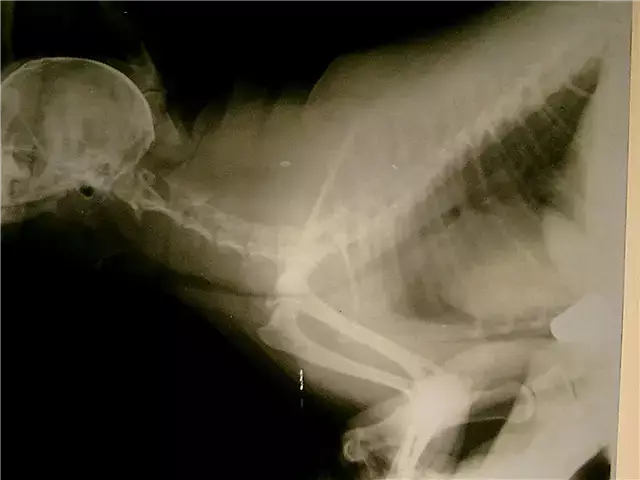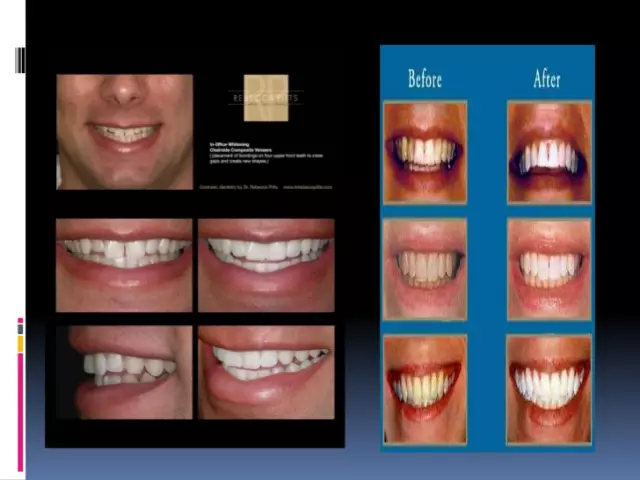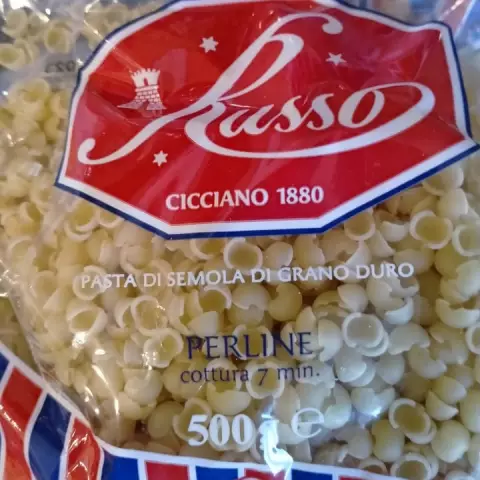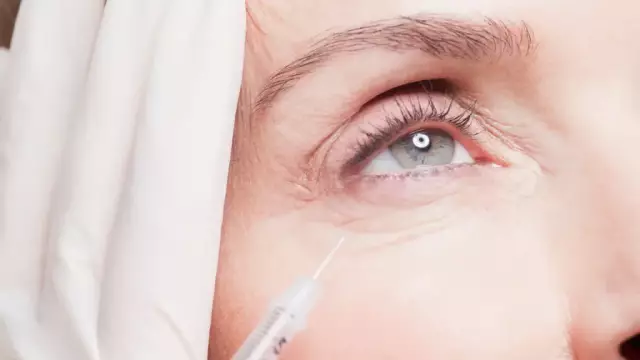- Author Rachel Wainwright wainwright@abchealthonline.com.
- Public 2023-12-15 07:39.
- Last modified 2025-11-02 20:14.
Trental
Instructions for use:
- 1. Release form and composition
- 2. Indications for use
- 3. Contraindications
- 4. Method of application and dosage
- 5. Side effects
- 6. Special instructions
- 7. Drug interactions
- 8. Analogs
- 9. Terms and conditions of storage
- 10. Terms of dispensing from pharmacies
Prices in online pharmacies:
from 156 rub.
Buy

Trental is a drug that improves the rheological properties of blood and enhances microcirculation in areas of impaired blood circulation.
Release form and composition
- enteric film-coated tablets: round, biconvex, white film shell (10 pcs. in blisters, 6 blisters in a cardboard box);
- concentrate for preparation of solution for infusion: colorless almost transparent liquid (5 ml in ampoules, in a cardboard box 5 ampoules).
Composition for 1 tablet Trental:
- active substance: pentoxifylline - 100 mg;
- auxiliary components: starch, magnesium stearate, talc, lactose, colloidal silicon dioxide;
- enteric film shell: talc, sodium hydroxide, methacrylic acid copolymer, macrogol (polyethylene glycol) 8000, titanium dioxide (E171).
Composition for 1 ml of Trental concentrate:
- active substance: pentoxifylline - 20 mg;
- auxiliary components: sodium chloride, water for injection.
Indications for use
- pathology of peripheral circulation of atherosclerotic origin (diabetic angiopathy, intermittent claudication), trophic disorders (gangrene, trophic ulcer of the leg);
- pathology of cerebral circulation due to cerebral atherosclerosis (dizziness, impaired concentration, memory impairment), ischemic and post-stroke conditions;
- discirculation of blood circulation in the vascular (middle) and reticular (inner) membranes of the eyeball;
- otosclerosis and other degenerative transformations against the background of vascular diseases of the inner ear, hearing loss.
Concentrate for the preparation of a solution for infusion Trental is also used for violations of peripheral circulation as a result of frostbite, post-thrombotic syndrome, etc.
Contraindications
Absolute contraindications:
- severe retinal hemorrhage, extensive bleeding, intracerebral hemorrhage;
- acute myocardial infarction;
- the period of pregnancy and breastfeeding (lactation);
- children and adolescents up to 18 years old;
- individual hypersensitivity to methylxanthines, pentoxifylline, and other components of the drug.
The solution for infusion Trental is additionally contraindicated for use in severe arrhythmias, severe atherosclerotic lesions of the coronary or cerebral arteries and uncontrolled arterial hypotension.
Trental is used with caution for: arterial hypotension [due to the risk of lowering blood pressure (BP)], chronic heart failure (CHF), gastric ulcer and duodenal ulcer, renal dysfunction with creatinine clearance <30 ml / min and / or severe liver dysfunction (increased risk of accumulation of pentoxifylline, which increases the likelihood of side effects), recent surgical interventions, increased tendency to bleeding as a result of taking anticoagulants or due to disorders in the blood coagulation system (increased risk of more severe bleeding); additionally, for Trental tablets, severe cardiac arrhythmias (risk of worsening) are a relative contraindication.
Method of administration and dosage
The dosage and method of administration (form of release) Trental is determined by the attending physician, taking into account the characteristics of the patient's response to therapy, the severity of circulatory disorders, as well as the individual tolerance of the drug.
Film-coated tablets
Trental tablets are taken orally during meals or immediately after meals, swallowing whole and drinking plenty of water.
Recommended dosage regimen: 1 pc. (100 mg) 3 times a day with a gradual increase in the dose to 2 pcs. (200 mg) 2-3 times a day; maximum doses: single - 400 mg, daily - 1200 mg.
In patients with renal insufficiency with CC <30 ml / min, the daily dose may be reduced to 1-2 tablets (100-200 mg).
Concentrate for solution for infusion
A solution prepared from Trental concentrate is intended for intravenous (IV) drip infusion.
Recommended dosing regimen: 2 intravenous infusions per day: 2 ampoules - 200 mg of pentoxifylline diluted in 250 ml of Ringer's solution / 0.9% sodium chloride solution, or 3 ampoules - 300 mg in 500 ml of Ringer's solution / 0, 9% sodium chloride solution is poured into the patient intravenously drip, morning and afternoon. The compatibility of Trental concentrate with other infusion solutions should be checked on a case-by-case basis. It is allowed to use only clear solutions.
The introduction of 100 mg of pentoxifylline (1 ampoule) should last at least 1 hour. If the presence of concomitant diseases, such as heart failure, requires a controlled reduction in infusion volumes, it is recommended to use a special infuser to regulate the infusion rate.
If clinically necessary, as prescribed by a doctor, it is possible to use the solution and Trental tablets in combination.
In more severe cases, with severe pain at rest, patients with gangrene or trophic ulcers (III-IV stage according to Fontaine's classification) are shown an infusion of Trental for 24 hours at a dose usually not exceeding 1200 mg of pentoxifylline. The individual dose of a daily infusion is determined at the rate of 0.6 mg / kg / hour, for a patient weighing 70 kg it will be 1000 mg of pentoxifylline, 80 kg - 1150 mg, etc.
In case of impaired renal function with CC <30 ml / min, the dose should be reduced by 30-50%, depending on the individual tolerance of the drug. This indicator should also be taken into account when adjusting the dose downward in patients with severe hepatic insufficiency.
In patients with low blood pressure and patients at risk (with severe coronary artery disease or with hemodynamically significant cerebral vascular stenosis), due to a possible decrease in blood pressure, therapy with low doses of pentoxifylline should be started, the dose of the drug should be increased gradually.
Side effects
The use of high doses of Trental or intravenous infusion exceeding the recommended infusion rate can cause the following side effects from organs and systems:
- nervous system: dizziness, headache, convulsions, sleep disturbances, anxiety;
- skin and subcutaneous fat: edema, hyperemia of the skin of the face, increased brittleness of the nails, flushing of the face and upper chest;
- digestive system: anorexia, xerostomia, intestinal atony;
- cardiovascular system: arrhythmia, tachycardia, cardialgia, decreased blood pressure, progression of angina pectoris;
- hemostatic system and hematopoietic organs: thrombocytopenia, leukopenia, pancytopenia, bleeding (from mucous membranes, vessels of the skin, intestines, stomach), hypofibrinogenemia;
- sense organs: scotoma, visual impairment;
- hypersensitivity reactions: skin hyperemia, itching, urticaria, anaphylactic shock, angioedema.
Cases of the development of intrahepatic cholestasis, an increase in the activity of liver enzymes, and the occurrence of aseptic meningitis were extremely rare.
Taking Trental tablets can cause stomach pressure and fullness in the digestive system, nausea, vomiting and diarrhea.
Overdose symptoms:
- tablets: urge to vomit, chills, dizziness, a sharp decrease in blood pressure, arrhythmia, tachycardia, areflexia, redness of the skin, tonic-clonic seizures, loss of consciousness;
- solution for infusion: sweating, weakness, dizziness, nausea, cyanosis, decreased blood pressure, fainting, tachycardia, drowsiness / agitation, hyperthermia, arrhythmia, areflexia, tonic-clonic convulsions, signs of gastrointestinal bleeding (vomiting like coffee grounds), loss consciousness.
Therapy of the condition is symptomatic, the focus should be on maintaining respiratory function and blood pressure. Diazepam is administered to relieve convulsive seizures.
The appearance of the first signs of an overdose (nausea, excessive sweating, cyanosis) requires immediate discontinuation of the drug. The patient should be provided with a lower position of the head and upper body and control of the free airway.
special instructions
Throughout the course of therapy, blood pressure should be monitored.
Patients with diabetes mellitus taking hypoglycemic agents may need to adjust the dose of pentoxifylline, since the appointment of high doses can cause severe hypoglycemia.
The simultaneous use of Trental with anticoagulants is carried out under close monitoring of the parameters of the blood coagulation system.
Patients who have recently undergone surgery need to systematically monitor the level of hemoglobin and hematocrit.
A dose reduction of pentoxifylline is carried out in patients with low and unstable blood pressure.
Elderly patients may need to reduce the dose of Trental due to increased bioavailability and a decrease in the rate of excretion.
In children and adolescents, the efficacy and safety of using pentoxifylline has not been studied enough.
Smoking can reduce the therapeutic efficacy of Trental.
A solution of pentoxifylline for compatibility with other infusion solutions in each case should be checked separately.
The IV infusion is carried out when the patient is placed in the supine position.
Drug interactions
- inhibitors of angiotensin-converting enzymes, nitrates (drugs that lower blood pressure), indirect and direct anticoagulants, thrombolytics (drugs that affect the blood coagulation system), antibiotics (including cephalosporins): pentoxifylline can enhance their effect;
- cimetidine: increases the plasma concentration of pentoxifylline, increasing the risk of side effects;
- other xanthines: nervous excitement may increase excessively;
- insulin / oral antidiabetic agents: it is possible to increase their hypoglycemic effect and increase the risk of hypoglycemia (it is required to strictly monitor such patients);
- theophylline: its effect may be enhanced with an increase in the likelihood of side effects.
Analogs
Analogs of Trental are: Agapurin, Vazonit, Pentilin, Pentoxifylline, Pentoxifylline SR Zentiva, Trenpental, Flexital, etc.
Terms and conditions of storage
Store in a dry, dark place at a temperature not exceeding 25 ° C. Keep out of the reach of children.
Shelf life is 4 years.
Terms of dispensing from pharmacies
Dispensed by prescription.
Trental: prices in online pharmacies
|
Drug name Price Pharmacy |
|
Trental 20 mg / ml concentrate for preparation of solution for infusion 5 ml 5 pcs. 156 r Buy |
|
Trental 100 mg enteric film-coated tablets 60 pcs. 433 r Buy |
|
Trental 400 400 mg film-coated tablets of prolonged action 20 pcs. 557 r Buy |
|
Reviews Trental 400 557 r Buy |
|
Trental tablets p.p. prolonged action 400mg 20 pcs. 697 r Buy |
|
Trental tablets p.p. prolonged action 400mg 60 pcs. 1281 RUB Buy |
|
Trental 400 400 mg film-coated tablets of prolonged action 60 pcs. 1281 RUB Buy |
Information about the drug is generalized, provided for informational purposes only and does not replace the official instructions. Self-medication is hazardous to health!






